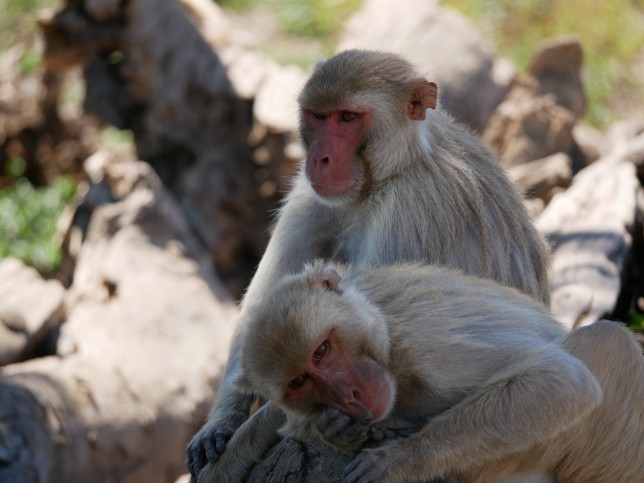A study conducted by researchers from Imperial College London has unveiled that same-sex sexual behavior is the norm among male macaque monkeys.
The findings challenge the prevailing notion that homosexuality is unique to humans and shed light on its prevalence in the animal kingdom.
The team, led by Professor Vincent Savolainen, examined rhesus macaques living in Puerto Rico and discovered that an astonishing 72 percent of males engaged in homosexual acts.
“We found most males were behaviorally bisexual, and that variation in same-sex activity was heritable,” stated Jackson Clive, an author of the study.
The research, which spanned from 2017 to 2020, involved observing 236 male macaques within a larger colony of 1,700 residing on the island of Cayo Santiago.
In addition to behavioral observations, the team conducted genetic analyses and reviewed pedigree records dating back to the mid-1950s.

The study revealed that 72 percent of the male macaques exhibited same-sex mounting behavior, while only 46 percent engaged in different-sex mounting. Surprisingly, the researchers also found that the males who regularly participated in same-sex mounting were more likely to support each other in conflicts, indicating potential social benefits linked to this behavior.
Contrary to expectations, the researchers discovered that males who engaged in same-sex behavior were more successful in reproducing, debunking the belief that such behavior hinders procreation. The team used pedigree data to demonstrate that same-sex behaviors were 6.4 percent heritable, similar to other primate behaviors like grooming. They also identified a genetic correlation between males who were more frequently the “mounters” or the “mountees.”
“Our research therefore shows that same-sex sexual behaviors can be common amongst animals and can evolve,” explained Dr. Clive.
The findings suggest that some degree of same-sex behavior can have adaptive benefits in animal populations.
Professor Savolainen emphasized the importance of dispelling misconceptions about same-sex behavior, stating, “Unfortunately, there is still a belief amongst some people that same-sex behavior is ‘unnatural,’ and some countries sadly still enforce the death penalty for homosexuality. Our research shows that same-sex behavior is, in fact, widespread amongst non-human animals.”

The study provides further evidence supporting the existence of homosexuality in nature, which has been observed in approximately 1,500 animal species, including humans. Various theories attempt to explain the prevalence of same-sex behavior, such as its potential role in indirect genetic propagation and the development of mating techniques.
Read also: Dating a less attractive man could be the key to your happiness in life, Unbelievable
The research conducted by Imperial College London contributes to advancing scientific understanding of same-sex behavior, with a focus on exploring its benefits within animal societies and the natural world. By studying male macaque monkeys, the team revealed that same-sex behavior strengthens social bonds within the community, promoting a more inclusive perspective on diverse sexual behaviors across species.
As ongoing research continues to unveil the nuances of homosexuality in nature, the prevalence and significance of same-sex behavior in individual species remain areas of active investigation.
Subscribe to Switch TV















